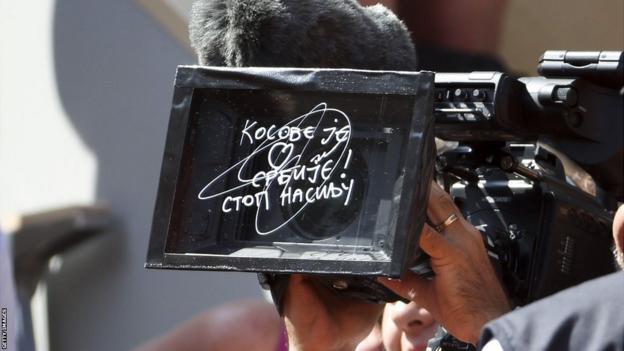
| Dates: 28 May-11 June Venue: Roland Garros, Paris |
| Coverage: Live text and radio commentaries of selected matches across BBC Radio 5 Sports Extra, the BBC Sport website and app |
Novak Djokovic says he is “aware people would disagree” with him writing a political message about Kosovo on a French Open camera lens but it is an issue he “stands for”.
Djokovic, 36, wrote “Kosovo is the heart of Serbia. Stop the violence” after his first-round win on Monday.
France’s sports minister said the Serb’s actions were “not appropriate” and should not happen again.
“A drama-free Grand Slam, I don’t think it can happen for me,” said Djokovic.
“I guess that drives me, as well.”
The phrase Djokovic wrote is in reference to recent tension in Kosovo, which declared independence from Serbia in 2008. Serbia has never recognised Kosovo’s independence.
There has been violence in the past days following the installation of ethnic Albanian mayors in the north of the country, with police and Nato troops clashing with Serb protesters.
In his post-match news conference, the 22-time Grand Slam champion attempted to put the controversy behind him.
Asked if he had thought about the negative reaction to his actions, Djokovic said: “Of course I’m aware that a lot of people would disagree, but it is what it is. It’s something that I stand for. So that’s all.”
After beating Hungary’s Marton Fucsovics in the second round on Wednesday, Djokovic marked the lens – which the winner does after every French Open match – with his signature.
World governing body the International Tennis Federation said Djokovic’s statement did not violate any rules because the Grand Slam rulebook does not ban political statements.
French sports minister Amelie Oudea-Castera said there needs to be a “principle of neutrality for the field of play”.
Oudea-Castera said she made a distinction for messages in support for Ukraine in the face of Russia’s invasion, adding that she did not put Kosovo and Ukraine “on the same level”.
That includes supporting Ukrainian player Marta Kostyuk, who was booed by the crowd after she refused to shake hands with Aryna Sabalenka of Belarus on Sunday.
Belarus is an ally of Russia and allowed troops to use its territory to launch last year’s invasion of Ukraine.
Djokovic, whose father was born in Kosovo, said earlier in the week he was “against wars, violence and any kind of conflict” but that the situation in Kosovo is a “precedent in international law”.
“Especially as a son of a man born in Kosovo, I feel the need to give my support to our people and to the entirety of Serbia,” he said on Monday.
“Kosovo is our cradle, our stronghold, centre of the most important things for our country. There are many reasons why I wrote that on the camera.
“Of course it hurts me very much as a Serb to see what is happening in Kosovo and the way our people have been practically expelled from the municipal offices, so the least I could do was this.”
Kosovo Olympic authorities have asked the International Olympic Committee (IOC) to open disciplinary proceedings against Djokovic, accusing him of stirring up political tension.
Djokovic’s message ‘bound to ruffle feathers’
Guy Delauney, BBC News Balkans correspondent
“Kosovo is the heart of Serbia” might seem like an odd statement. After all, Kosovo became independent in 2008 – and its geographical location in the south west meant that, even before then, it was always on the periphery of Serbia.
But its symbolic significance remains highly important to many Serbs. The 1389 Battle of Kosovo has been mythologised as the crucial event in the forging of Serbian identity. And many of the most important sites of the Serbian Orthodox Church are within modern-day Kosovo.
Serbia is one of scores of countries which refuse to recognise Kosovo’s unilateral declaration of independence. And Serbians with family ties to Kosovo are particularly keen to ensure that Serbia’s policy of non-recognition continues.
It has been a turbulent month for Serbia – with mass shootings and multiple protests – and ethnic-Serbs in Kosovo. By writing his courtside message, the country’s sporting icon was showing his support – but in a way which was bound to ruffle feathers.
With his marker pen scribble, Djokovic neatly illustrated the enduring complexity of the situation.



